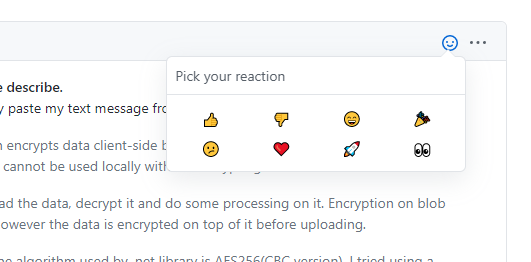Anyone who has worked in software knows that one word that will invoke a whole range of emotions – joy, excitement, perhaps a bit of fear – is planning. Azure iterates continuously on plans, but we have two major planning cycles a year – called semesters. Semester planning is a time during which we work together to re-prioritize community requests and coordinate across teams to deliver the things the community is most excited about. Each semester is named after an element in the periodic table – we are currently in Cobalt and will be moving into Nickel in June. This means May is a BIG month around Azure as we lock our set of Nickel plans.
In the Azure SDK team, we have a unique planning vantage point as we work across all Azure services to deliver a cohesive developer experience. In the past, we have written about the triage process we have in place to distribute GitHub based feedback across Azure teams. Planning is one of the best times to take advantage of this process to help us deliver the developer experience features that the community wants. Over the first two weeks of May, the Azure SDK team will be reviewing community feedback in reactions and comments to get an understanding of what our community want the most, and work with service team partners to get them delivered. This means that the next two weeks are an excellent time to get in your feedback!
Ways to Leave Feedback
Nickel Planning Cycle
For the Nickel planning cycle, we have made some specific “What’s next?” issues for community discussion. Feel free to visit any of these issues and leave comments on what you want to see in the future.
Feature Requests
Alternatively, you can raise a feature request in our repos at any time. The Azure SDK team uses the feature-request label to track these requests. This means that the easiest way to see outstanding requests it to filter to this label in our GitHub repositories.
If an issue has a milestone date listed, then good news – it is already on our backlog!

If it doesn’t, then it’s a great opportunity for you to leave feedback.

Design Guidelines Feedback
In general, we also look for feedback on our design guidelines on a rolling basis – to find proposed changes to design guidelines, look for the tag ArchBoard Guidelines.
Leaving Issue Feedback
There are several ways to leave feedback on Azure SDK GitHub issues. We regularly track the reactions to issues. If you leave us thumbs up (+1), heart, rocket, or hooray on the main issue, we will assume you are interested in the feature being delivered. If you leave thumbs down (-1) or confused on the main issue, we’ll assume you have reservations.

Another way to leave feedback is in the comments! We particularly appreciate comments that describe your specific use case, and give sample code if possible. This helps us get a deeper understanding of the exact capabilities you are looking for, and the gaps we currently have.
Azure SDK Blog Contributions
Thank you for reading this Azure SDK blog post! We hope that you learned something new and welcome you to share this post. We are open to Azure SDK blog contributions. Please contact us at azsdkblog@microsoft.com with your topic and we’ll get you set up as a guest blogger.
Azure SDK Links
- Azure SDK Website: aka.ms/azsdk
- Azure SDK Intro (3 minute video): aka.ms/azsdk/intro
- Azure SDK Intro Deck (PowerPoint deck): aka.ms/azsdk/intro/deck
- Azure SDK Releases: aka.ms/azsdk/releases
- Azure SDK Blog: aka.ms/azsdk/blog
- Azure SDK Twitter: twitter.com/AzureSDK
- Azure SDK Design Guidelines: aka.ms/azsdk/guide
- Azure SDKs & Tools: azure.microsoft.com/downloads
- Azure SDK Central Repository: github.com/azure/azure-sdk
- Azure SDK for .NET: github.com/azure/azure-sdk-for-net
- Azure SDK for Java: github.com/azure/azure-sdk-for-java
- Azure SDK for Python: github.com/azure/azure-sdk-for-python
- Azure SDK for JavaScript/TypeScript: github.com/azure/azure-sdk-for-js
- Azure SDK for Android: github.com/Azure/azure-sdk-for-android
- Azure SDK for iOS: github.com/Azure/azure-sdk-for-ios
- Azure SDK for Go: github.com/Azure/azure-sdk-for-go
- Azure SDK for C: github.com/Azure/azure-sdk-for-c
- Azure SDK for C++: github.com/Azure/azure-sdk-for-cpp

0 comments